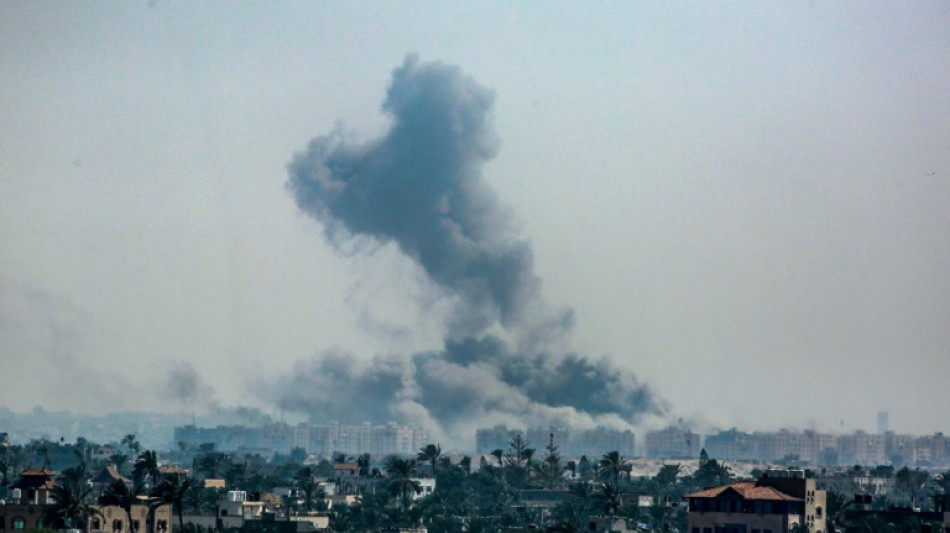
RYCEF
0.2000


US Secretary of State Antony Blinken was due in Israel on Sunday as mediators seek to cement a Gaza ceasefire deal, while a senior Hamas official dismissed "American diktats" in negotiations.
Making his ninth trip to the Middle East since the Gaza war broke out with the Palestinian militant group's October 7 attack, Blinken is expected to meet Israeli leaders before truce talks resume in Cairo in the coming days.
US, Qatari and Egyptian mediators have said negotiations to clinch a ceasefire in the more than 10-month-old war were making progress, and US President Joe Biden said "we are closer than we have ever been".
But Hamas political bureau member Sami Abu Zuhri undercut the cautious optimism, telling AFP that signs of progress after two days of talks in Doha were "an illusion".
"We are not facing a deal or real negotiations, but rather the imposing of American diktats," he said.
Previous optimism during months of on-off truce talks has proven unfounded.
But the stakes have risen since the late July killings in quick succession of Iran-backed militant leaders, including Hamas political chief Ismail Haniyeh, and as the humanitarian crisis in the besieged Gaza Strip has deepened with a feared polio outbreak.
After mediators announced they had put forward a "bridging proposal" to close remaining gaps between the warring sides, Hamas said it rejected "new conditions" from Israel and called for a plan outlined by Biden in late May to be implemented.
Before Blinken departed for Tel Aviv on Saturday night, Israeli Prime Minister Benjamin Netanyahu's office called for "heavy pressure" on Hamas to reach a breakthrough.
The Palestinian group as well as some analysts and Israeli protesters have accused Netanyahu of hamstringing a deal to safeguard his hard-right ruling coalition.
"We have a prime minister that is not so much willing to release the hostages, to finish the war, because he has he own interests," Yossi, a 53-year-old protester, said as thousands rallied in Tel Aviv demanding a deal to bring home the captives still held in Gaza.
- Strikes in Lebanon, Gaza -
As efforts towards a long-sought truce continued, so has the violence in Gaza but also in the Israeli-occupied West Bank and in Lebanon, where Hamas ally Hezbollah has traded near-daily fire with Israeli forces throughout the war.
Lebanon's health ministry said an Israeli air strike on Saturday in the Nabatieh area killed 10 Syrians, including a woman and her two children, one of the deadliest attacks on south Lebanon since October.
Israel's military said it struck a Hezbollah weapons storage facility.
In Hamas-run Gaza, the civil defence agency said an Israeli air strike killed 15 people from a single Palestinian family.
"We are in the morgue seeing indescribable scenes of limbs and severed heads and children who are dismembered," said Omar al-Dreemli, a relative.
The Israeli military told AFP its forces had targeted rocket launchers in central Gaza and that it was looking into "reports... that as a result of the strike, civilians in an adjacent structure were killed".
The deaths in Al-Zawaida helped push the Gaza health ministry's war death toll to 40,074.
Hamas's October 7 attack on Israel that triggered the war resulted in the deaths of 1,198 people, mostly civilians, according to an AFP tally of Israeli official figures.
The war has destroyed much of Gaza's housing and healthcare infrastructure, leaving children vulnerable to preventable diseases.
The United Nations appealed Friday for seven-day pauses in the fighting so it could vaccinate children against polio, as the Palestinian health ministry reported Gaza's first polio case in 25 years.
- 'Conclude the agreement' -
Iran and its regional allies have vowed retaliation for Haniyeh's death in Tehran, an attack which Israel has not claimed responsibility for, and for an Israeli strike in Beirut that killed a top Hezbollah commander.
In Israel, Blinken will seek to "conclude the agreement for a ceasefire and release of hostages and detainees", the State Department said.
The proposed deal, which Biden outlined on May 31 but attributed to Israel, would freeze fighting for an initial six weeks and lead to the release of hostages and prisoners.
During Hamas's October 7 attack, militants seized 251 hostages, 111 of whom are still held in Gaza, including 39 the military says are dead. More than 100 were freed during a one-week truce in November.
In Gaza, civilians have been on the move again after the Israeli military issued fresh evacuation orders.
"During each round of negotiations, they exert pressure by forcing evacuations and committing massacres," said Issa Murad, a Palestinian displaced to cental Gaza's Deir al-Balah.
Israeli troops have also expanded operations around Gaza's main southern city of Khan Yunis, Israel's military said Saturday.
In the West Bank, Israel said late Saturday it had killed "two senior Hamas officials" in Jenin.
Hamas's armed wing confirmed the deaths of Ahmad Abu Ara and Raafat Dawasi, saying they had been responsible "for planning and executing several qualitative operations".
burs-lb/ami
J.Barnes--TFWP